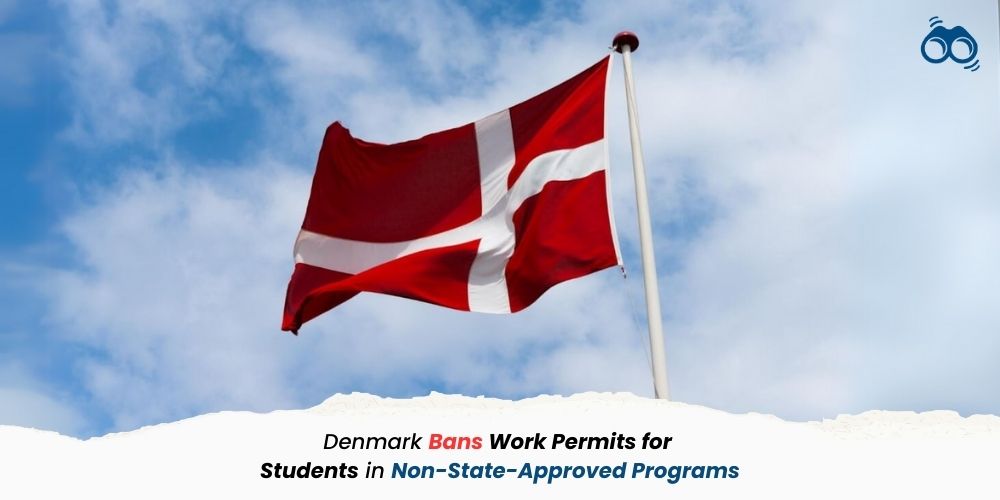Denmark Restricts Work Permits for International Students: What It Means for Higher Education
Denmark's Immigration Policy Shift: New Regulations Limit International Student Rights
Denmark has recently tightened its regulations on residence permits for international students to safeguard the integrity of its higher education system and labour market. Previously, non-EU/EEA students enrolled in Danish universities were permitted to work up to 20 hours per week during the academic term and full-time during the summer, while their spouses or partners could apply for work permits based on the student’s residence status. These policies were introduced to attract international talent and provide financial support during their studies.
However, concerns were raised over reports that some students were using the visa system to access low-wage jobs rather than focusing on their education. In response, the Danish government announced on 11 March 2025 that, from 2 May 2025, students enrolled in non-state-approved higher education programmes would no longer qualify for work permits, extended job search stays, or the right to bring accompanying family members. This policy adjustment aims to ensure that student visas are granted solely for educational purposes rather than serving as an indirect route to employment.
Despite these restrictions, authorities have confirmed that individuals admitted to a publicly accredited institution for a higher education or PhD programme will still be eligible for residence permits. The policy shift reflects a change in Denmark’s approach to international student mobility and employment, which observers suggest could have a significant impact on prospective students considering Denmark as a study destination.
On 30 April 2025, the Ministry of Immigration and Integration introduced an amendment to the Executive Order on residence and work permits. Under the revised regulations, students in non-state-approved programmes would no longer be entitled to limited work permits, six-month job search stays, or the right to bring family members. To qualify for residence permits, educational programmes must now receive state approval or be assessed by the Danish Evaluation Institute.
The new rules, effective from 2 May 2025, will apply only to applications submitted on or after that date, reinforcing Denmark’s commitment to ensuring that student visas are granted exclusively for genuine educational purposes. Officials have clarified that foreign nationals who applied for or received student visas for non-state-approved programmes before this date will not be affected and will retain their existing rights, including limited work permits, job search stays, and permission to bring family members.
Additionally, authorities have confirmed that foreign nationals who were granted residence permits as accompanying family members before 2 May 2025 will remain exempt from the new restrictions. These individuals, along with the students they accompany, will retain their rights even if they apply for a residence permit extension after this date. This exemption aims to provide continuity for those already residing in Denmark under the previous regulations.
While Denmark’s decision seeks to prevent visa misuse and reinforce academic integrity, it also raises concerns about its potential consequences for students pursuing education beyond state-approved institutions. As immigration policies evolve globally, finding a balance between regulation and fostering international talent remains a challenge. The ultimate success of these measures will depend on how effectively they support both institutional oversight and the aspirations of genuine students.
Editor’s Note:
Denmark’s decision to tighten residence permit rules for international students marks a big change in how the country approaches higher education and immigration. The goal is to make sure student visas are used mainly for studying. However, this move could have negative side effects, especially when it comes to attracting and keeping talented students from around the world. One concern is that fewer international students might choose to study in Denmark, especially in programmes that are not approved by the state. The new rules remove work permits, job search opportunities, and the chance to bring family, which may discourage students who want more flexibility. This could reduce the diversity and international presence in Danish universities and affect their global reputation. Many international students work part-time and help support industries that rely on them. Not allowing students to stay and look for jobs after graduation might push skilled workers to choose other countries with more welcoming policies.
Skoobuzz highlights that in the long run, Denmark may appear less open to international students. While it is important to protect immigration systems, being too strict could harm Denmark’s ability to grow its research, economy, and reputation. The key challenge will be finding the right balance, keeping the system fair while still making Denmark an attractive place to study and work.














0 Comments (Please Login To Continue)